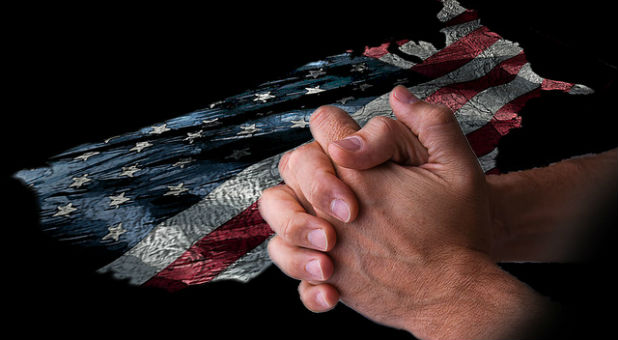The Modern Crusade to Silence Prayer Is Not Only Ungodly, but ‘Un-American’
For the first 180 years of this nation’s existence, prayer was as American as mom, baseball and apple pie. Americans prayed—everywhere. It was part of our heritage. In my own lifetime, I can remember when prayer was a common thing at high school graduations, high school football games, city council meetings and just about any public venue.
This began to drastically change when the Supreme Court, in 1962, banned prayer in public schools. Since that time, there has been a growing hostility toward Christian prayer, and a crusade to ban it in every public venue.
A recent target of this un-American, anti-prayer crusade is Joe Kennedy of Bremerton High School in Washington state, a Marine Corps veteran and coach of the football team. Kennedy has a long tradition of kneeling to pray at the end of each football game and is often joined by some of the players.
He was recently notified by the District Superintendent, Aaron Leavell, that his public prayers must stop, even though it is a personal prayer on his part and no one is required, or even asked, to join him. The notification to cease and desist included the added warning, “Your talks with students may not include religious expressions, including prayer. They must remain entirely secular in nature.”
This is ironic in light of the fact that America was birthed in prayer. Prayer played a vital role in its beginning—at each Continental Congress, with George Washington, with the Continental Army and with the American populace in general. We might say that prayer was part of being American!
Prayer at the First Continental Congress
The First Continental Congress met in Philadelphia to decide how to respond to Britain’s growing attempts to tax and control the lives of the colonists without their participation. Because of growing colonial protests, British troops had been dispatched to quell the “disturbances.”
As delegates traveled from New England in the north, and from as far south as South Carolina, it weighed heavily on their minds how two regiments of British troops had just occupied the city of Boston and closed its port.
At the first meeting on Sept. 5, 1774, it was proposed that they begin their deliberations with prayer. Two delegates opposed the motion on the grounds that they were such a diverse religious group—Anglicans, Puritans, Presbyterians, Quakers and so on—that it would be impossible for them to pray together.
Samuel Adams, a Puritan from Boston, arose and said that he was not a bigoted man and that he could join in prayer with any person of piety and virtue who loved his country. He went on to say that although he was a stranger to Philadelphia he had heard of an Anglican minister, a Rev. Dusche, who was such a man and proposed that they invite him to come and lead them in prayer.
Adams’ proposal was approved and Dusche was asked to preside over a time of Bible reading and prayer. As Dusche, elderly and grey-haired, stood before the Congress, he began by reading the entire 35th Psalm, which powerfully impacted everyone present. It is a prayer of David for deliverance and begins with the words, “Plead my cause, O Lord, with my adversaries; fight those who fight me.” The psalm ends with praise for God’s deliverance.
As Dusche read the psalm, a unique sense of God’s presence filled the room and tears flowed from many eyes. John Adams wrote to his wife, Abigail, of the impact of the Bible reading and prayer on the delegates. He said:
“Who can realize the emotions with which they turned imploringly to heaven for divine interposition and aid. It was enough to melt a heart of stone? I never saw a greater effect upon an audience. It seems as if heaven had ordained that Psalm to be read that day. I saw tears gush into the eyes of the old, grave pacific Quakers of Philadelphia. I must beg you to read that Psalm” (Hyatt, America’s Revival Heritage, 69).
After reading the psalm, Dusche began praying for the delegates, for America and especially for the city of Boston and its inhabitants who were under siege. As he began praying, the Anglicans, such as George Washington and Richard Henry Lee, knelt in prayer according to their custom. The Puritans, according to their custom, sat with bowed heads and prayed. Others prayed according to their own unique customs. But although their outward manners differed, there was a singleness of heart and purpose as they all united in prayer for God’s assistance and intervention for America.
The Influence of the Great Awakening
This could only happen because there had been a great spiritual awakening (1726-1770) that created a moral and prayerful tone throughout the colonies. When, for example, the Great Awakening came to Philadelphia, prayer became so prominent that Benjamin Franklin said that one could not walk down any street in the city without hearing prayer and praise coming from houses on every street (Eddie Hyatt, The Faith & Vision of Benjamin Franklin, 33).
Through the incessant labors of revivalists such as George Whitefield, denominational walls were broken down and the scattered colonists, for the first time, began to see themselves as “one nation under God.” Through the Great Awakening, prayer became a very real part of the American experience. Prayer became as American as mom and apple pie.















































